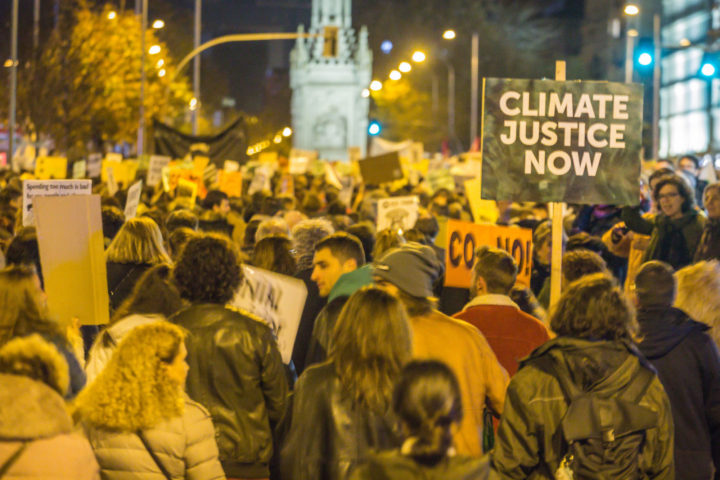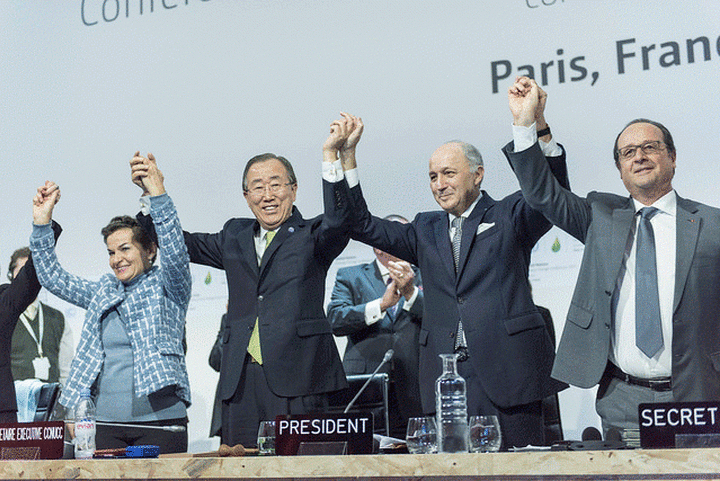From Madrid to Glasgow: Five big ones for the UK
As one UN climate summit closes, eyes turn to the next - the UK's - and the challenges and opportunities ahead
By Richard Black
Share
Last updated:
The 2019 UN climate summit is over, and… now the serious stuff begins.
Yes, of course the summit just finished in Madrid was a serious undertaking; and for many, its lack of clear outcomes is a disappointment.
But if the major aim of the UN climate convention is to curb greenhouse gas emissions, then the 2020 summit will be considerably more serious; because under the Paris Agreement, this is the year when countries are due to respond to the science and ramp up their carbon-cutting pledges.

And it’s happening in Glasgow in less than 11 months’ time, with Boris Johnson’s government in charge of the diplomacy.
We’ve written elsewhere about the major requirements for the summit – a significant number of countries upping their commitments for 2030, a significant number committing to reach net zero emissions by 2050, and delivery of the $100bn per year for the poorest nations first promised a decade ago – so I won’t get into the detail again here. No point in scrutinising the Madrid outcome in detail either, as CarbonBrief has done a typically forensic job on it.
Rather, here are five challenges and opportunities that have been sharpened by the (non-)outcome of the Madrid summit – challenges that the UK team has to be thinking about now, because... there’s considerably less than a year to go.
Britain is not an island
How to persuade sufficient governments to accelerate their carbon-cutting programmes on the road to Glasgow? That’s the prize… but so far, fewer than half of the world’s nations have said they will, and a fair few countries with high emissions have indicated they probably won’t (Saudi Arabia, the US, Australia and Brazil among them).
The answer, in a single word: alliances. Alone, the UK can’t work any magic here; with others, it can.
Three alliances in particular may be crucial.
One is the European Union. It’s early days for the new Parliament and Commission, but already the bloc has agreed to move to a net zero economy in 2050 and cut emissions faster by 2030. If the EU were a country it would be the world’s third-largest national emitter. This is, then, a significant chunk of the global economy and body politic that is acting with the science. Whatever the state of Brexit negotiations, journeying in partnership with the EU on the road to Glasgow will bring rewards.
The second is China. The world’s largest emitter, it is hosting a critically important UN nature summit in October. Peoples, governments and businesses are looking to China for leadership to turn back nature loss. Britain has an unparalleled set of resources – science, conservation bodies, Sir David Attenborough. There is an obvious alliance to be made.
The third is the vast group of 80-odd poorer nations especially at risk from climate change impacts – small island states, glaciated mountain kingdoms, countries in the parched African tropics. Collectively they are the biggest group in the UN family and the conscience of the climate negotiations. Many are in the Commonwealth, and cultural ties to the UK abound. Listen, find common ground, and there is a major alliance to be made.
Get net zero done
Hosting a pivotally important UN climate summit is all about leadership, as the French demonstrated in 2015.

The UK has quite a few climate leadership credentials – the pioneering 2008 Climate Change Act, a G7-leading decarbonisation record, and the net zero target that entered legislation in June.
But… the government does not yet have in place the policies to meet that target.
The Committee on Climate Change, the government’s statutory advisers, observed in the autumn that the UK’s leadership credentials rest ‘on the recent decision to make Net Zero law – but also on demonstrating that there are plans in place to meet it.’ Unless and until government puts them in place, scientists, environment groups, journalists and other nations are going to be putting its ‘leadership’ claim under persistent and increasingly painful scrutiny.
As Johnston’s communications guru Isaac Levido may not yet have observed but probably soon should: 'Get Net Zero Done'. Get those policies in place (and there are many options that really are oven-ready), and all the pain goes away… and the UK has a far greater chance of bringing COP26 to a successful conclusion.
Money doesn’t grow on trees
There’s growing interest in planting trees to absorb carbon dioxide and thus help curb climate change. Many companies want to do it, the entire global airline industry wants to do it, some of Boris Johnson’s closest advisors want to do it.
And it can be a genuine positive… if it’s done with a stringent set of rules in place that mean planted forests can’t summarily be ripped up, people’s livelihoods and capacity to grow their food aren’t affected, nature is able to thrive and the captured carbon is accounted for rigorously.
At the Madrid summit it became clear that a small group of countries headed by Australia and Brazil want to bend the rules under development so far out of shape that the original point would become unrecognisable – essentially, allowing governments to claim credit and get cash for projects that wouldn’t necessarily have any impact on climate change. The UK, to the government’s credit, joined a group of 30 nations opposing the putsch and it was put down – at least for now.
On the road to Glasgow, this issue will re-emerge. Those same countries will bid again for weak, meaningless rules. And Mr Johnson’s instinct may be to deal, because his government seems to be very keen on launching an initiative to promote ‘Nature-based Solutions’ to climate change that he can claim as the UK’s big contribution.
If this is the case, he’ll have to fight his instincts… because the entirety of the conservation movement will be telling him loudly that false solutions don’t tackle anything. A nature-based solution is nothing unless it really does some of the solving. Here, no deal really is better than a bad deal - though a good deal is better still.
Trade… but not at any price
Mention of Australia leads on to another issue that’ll soon be looming large – the much-vaunted free trade deals that Mr Johnson will be pursuing during 2020.

Among the nations on his list are the US, which presumably will not be keen to ensure that the parameters of the deal are compatible with a 30-year transition from fossil fuels… and Australia, where the same Isaac Levido recently helped Scott Morrison win the recent general election.
A trade deal could affect the UK’s transition to net zero – for example, by allowing in energy-wasteful white goods and so increasing the nation’s energy use. This sort of thing coming during the road to Glasgow would materially affect the UK’s claim to climate leadership; still more so would a sop to a nation such as Australia on an issue such as double-counting of tree-planting.
Closing the pincer
One impression gained last week at the Madrid summit is that while governments squabble, those that want to slow action on climate change and extend the high-carbon era are progressively being trapped in a pincer movement. Wielding one prong of the pincer are citizens, especially the youth – on the other are investors, bankers and asset-owners.
That young people are increasingly angry about climate change is hardly news. But what might be news to some is the extent to which the second group – the moneybags – are showing their concern.
In September, banks with one-third of the world’s banking capital ($47 trillion) in their coffers announced they would align their business models with the 1.5ºC global warming target set out in the Paris Agreement. In December, 177 companies including such household names as Carlsberg, Chanel and South East Water declared they too would align with the 1.5ºC target. Also in December, a group of investors with $37 trillion under management called for an end to fossil fuel subsidies.
The government machinery now cranking up for the Glasgow summit talks about wanting to ‘do something’ on green finance. Boosting ‘green’ logically also means getting rid of ‘brown,’ with an estimated 15% of global fossil fuel finance flowing through the City of London.
Here are the allies, on the two prongs of the pincer. Together, aided by government, they can go some way to cracking the nut in 2020.
Share